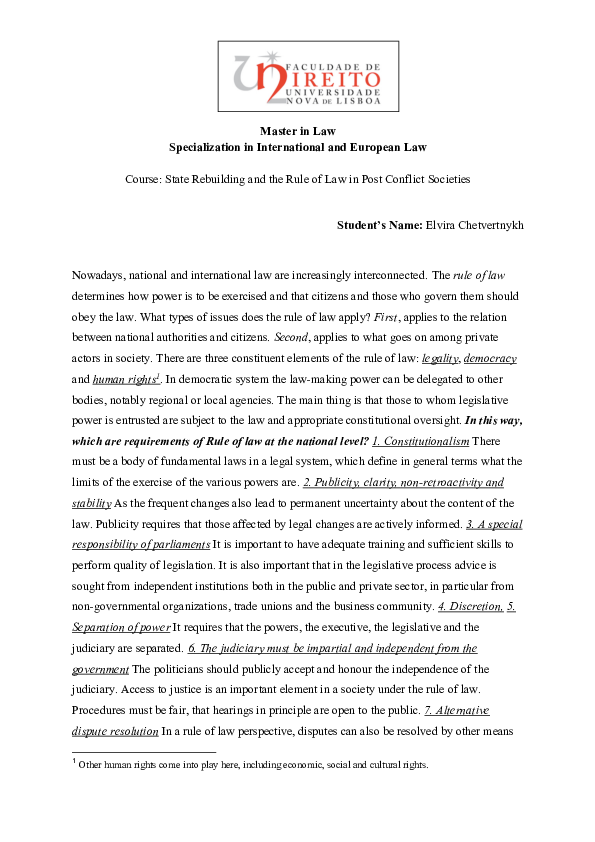Academia.edu no longer supports Internet Explorer.
To browse Academia.edu and the wider internet faster and more securely, please take a few seconds to upgrade your browser.
Summary of Article "Rule of Law: A Guide for Politicians". Published by Raoul Wallenberg Institute of Human Rights and Humanitarian Law.
Summary of Article "Rule of Law: A Guide for Politicians". Published by Raoul Wallenberg Institute of Human Rights and Humanitarian Law.
The rule of law at the international level depends on national law. The behaviour of the major states, and in particular the permanent members of the Security Council, will be a determining factor for the maintenance of international peace and security in the future. The future of the rule of law at the international level depends on national court, in order to ensure states, organizations and individuals comply with their obligations under international law.
Related Papers
This paper work outline that due to the evolution of European integration processes, a special role is given to the concept of the rule of law. European integration brings a series of changes and challenges that are reflected in the relationship between the rule of law at national level and international law. The rule of law refers to independent, transparent and consolidated public institutions, a harmonized legal framework in line with European Union standards, an efficient and fair justice system, as well as development reforms.
Revista de Direito Internacional
Rule of Law in the international arena: the importance of practices of legalityProceedings of the 5th International Conference on Social, Economic, and Academic Leadership (ICSEALV 2019)
The Rule of Law as the Leading Principle of International Law in the Age of Globalization2019 •
The rule of law is a moral ideal that protects distinctive legal values such as generality, equality before the law, the independence of courts, and due process rights. I argue that one of the main goals of an international rule of the law is the protection of individual and state autonomy from the arbitrary interference of international institutions, and that the best way to codify this protection is through constitutional rules restraining the reach of international law into the internal affairs of a state. State autonomy does not have any intrinsic value or moral status of its own. Its value is derivative, resulting from the role it plays as the most efficient means of protecting autonomy for individuals and groups. Therefore, the goal of protecting state autonomy form the encroachment of international law will have to be constrained by, and balanced against the more fundamental goal of an international rule of law, the protection of the autonomy of individual persons, best realized through the entrenchment of basic human rights.
RELATED PAPERS
Diritto Civile Contemporaneo
Buona fede e gravità dell'inadempimento nella «exceptio inadimpleti contractus».2017 •
Nora Vanaga and Toms Rostoks eds., Deterring Russia in Europe Defence Strategies for Neighbouring States, London: Routledge
Norway: NATO in the North2018 •
2005 •
Marine Biodiversity
First record of a mesophotic Pachyseris foliosa reef from Japan2012 •
The American Surgeon
Accuracy of the ACS NSQIP Online Risk Calculator Depends on How You Look at It: Results from the United States Gastric Cancer Collaborative2018 •
Fertility and Sterility
Comparison of subchorionic hematoma in medicated or natural single euploid frozen embryo transfer cycles2020 •
Innovation in Aging
Anthropometric and Physical Changes in Community Dwelling Old Adults During a 12 Week Resistance Exercise Program2018 •
Nuclear Instruments and Methods in Physics Research Section A: Accelerators, Spectrometers, Detectors and Associated Equipment
Calibration and monitoring of the MEG experiment by a proton beam from a Cockcroft–Walton accelerator2011 •
2023 •

 Elvira Chetvertnykh
Elvira Chetvertnykh